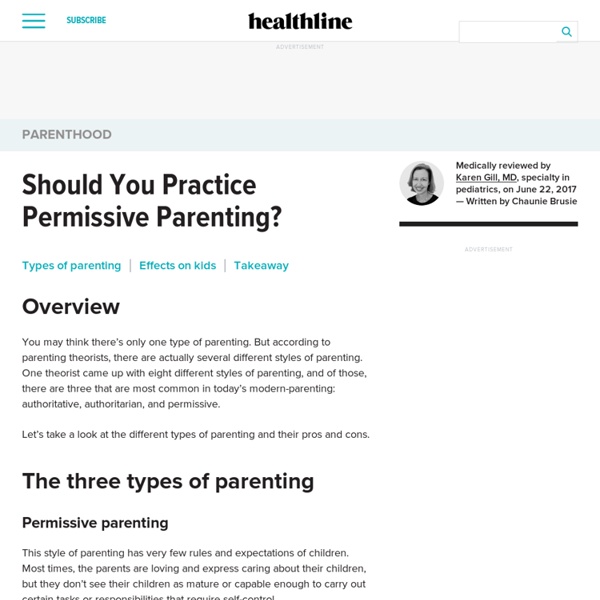The Long-Term Impact of Neglectful Parents
Source: JPagetRFPhotos/Shutterstock If you were emotionally or physically neglected as a child, it can be a difficult journey to healing. Neglect can be a hard thing to put your finger on, especially emotional neglect. article continues after advertisement Traumatic experiences like abuse and neglect have an adverse effect on children’s brain development. Young children naturally have a playful and curious spirit about them. We’ve all had the experience of seeing children mistreated in public. If you are an adult who was neglected, please know that you can find your true sense of self and worthiness.
How Does Authoritative Parenting Affect Children? | How To Adult
Authoritative parenting offers children a secure and affirming childhood. Your parenting methods may fit into one of a few different styles, with your specific style having a significant impact on your children. Established in the 1960s by psychologist Diana Baumrind, parenting styles include authoritarian, authoritative, permissive and uninvolved. Authoritative parenting establishes firm and loving limits for children. By exploring the effects of authoritative parenting on children, you can understand how this parenting style may benefit your children. Communication forms the foundation of the authoritative parenting model, as presented by Diana Baumrind in her report entitled, “Effects of Authoritative Parental Control on Child Behavior.” Authoritative Parenting in Action Authoritative parents use a combination of love and limits with children to help children learn and develop independence. Skills Developed Personality Traits
Parenting styles: An evidence-based guide
Parenting styles: An evidence-based guide © 2010-2018 Gwen Dewar, Ph.D., all rights reserved The concept of parenting styles was first introduced by Diane Baumrind to explain differences in the way parents attempt to control and socialize their children. Do parents show lots of affection, or remain aloof? Do they expect blind obedience, or encourage children to ask questions? Do they enforce limits, or let kids do as they please? Here you will find information about the four basic parenting styles: As I explain in the linked articles above, authoritative parenting is associated with the best child outcomes. For more information, see also these reviews of And here--below--is an overview of the four basic parenting styles: What researchers mean when they talk about parenting style, and how different styles seem to affect children. What do researchers mean when they talk about "parenting style"? But parenting is more than a set of specific practices. Wasn't there a compromise? What does it matter?
Authoritarian Parenting Style And Its Effects
By Stephen Walton © 2012 What's It All About?... and What Are It's Effects The "Authoritarian Parenting Style" is an extremely strict form of parenting that expects a child to adhere to rules and regulations set out by the parents with little or no input or communication from the child. Developmental psychologist Diana Baumrind in her studies based on the dimensions of "Parental Responsiveness" and "Parental Demandingness" conclude that: This type of parenting style is a harsh, rigid emotional climate that is low in parental responsiveness (the nurturing aspect of the child) and high in parental demandingness (control over the child). Open communication is generally not an option in this type of parenting style. Authoritarian parents feel they are the boss and their children should conform to the their demands without question. The rules are expected to be adhered to with no room for negotiation. Effects of The Authoritarian Parenting Style Why Some Parents Use This Approach Links
Research Findings
Uninvolved Parenting Style - Traits And Effects on Children
Uninvolved or neglectful parenting is a considerably new parenting style that does away with hand-holding and guiding the children. It lets them learn by themselves. Parents could be uninvolved in varying degrees. While most parents look after the basic needs such as food and shelter for their kids, some others neglect their children completely. MomJunction gives you deeper insights into uninvolved or neglectful parenting and whether or not it is healthy for your kids. What Is Neglectful Or Uninvolved Parenting Style? A parenting style where the child does not get an adequate amount of emotional support, physical time of the parent, basic needs such as food, shelter, health care, childhood play, and academic support, can be termed as being neglectful. (1) According to psychologist Diana Baumrind, neglectful parenting, or uninvolved parents have the least amount of involvement or response towards their children’s needs. Sponsored [ Read: Parenting Styles ] 1. 2. 3. 4. 5. 6. Scenario 1: 1. 2.
Gender neutral parenting – has it gone too far?
Overview
What Is Tiger Parenting? Tiger Moms Have Tough Rules, But a Lot of Warmth
Amy Chua coined the term "Tiger Mom" in her book, The Battle Hymn of the Tiger Mother, in 2011.Since then, it's been used to describe a parenting style that uses harsh tactics like fear and shame, but also one that prioritizes familial closeness. Studies show tiger parenting has different outcomes, depending on cultural factors. The term "Tiger Mom" burst onto the scene in 2011 when Amy Chua, a Yale law professor and mother of two daughters, published a book about her parenting style called The Battle Hymn of the Tiger Mother. In it, she ascribes tiger parenting to Chinese parents (though she admits she uses the terms "Chinese" and "Western" loosely — and, really, anybody can adopt this style). "Western parents try to respect their children's individuality, encouraging them to pursue their true passions, supporting their choices, and providing positive reinforcement and a nurturing environment," she writes in her book, which was excerpted by the Wall Street Journal.
Uninvolved Parenting



